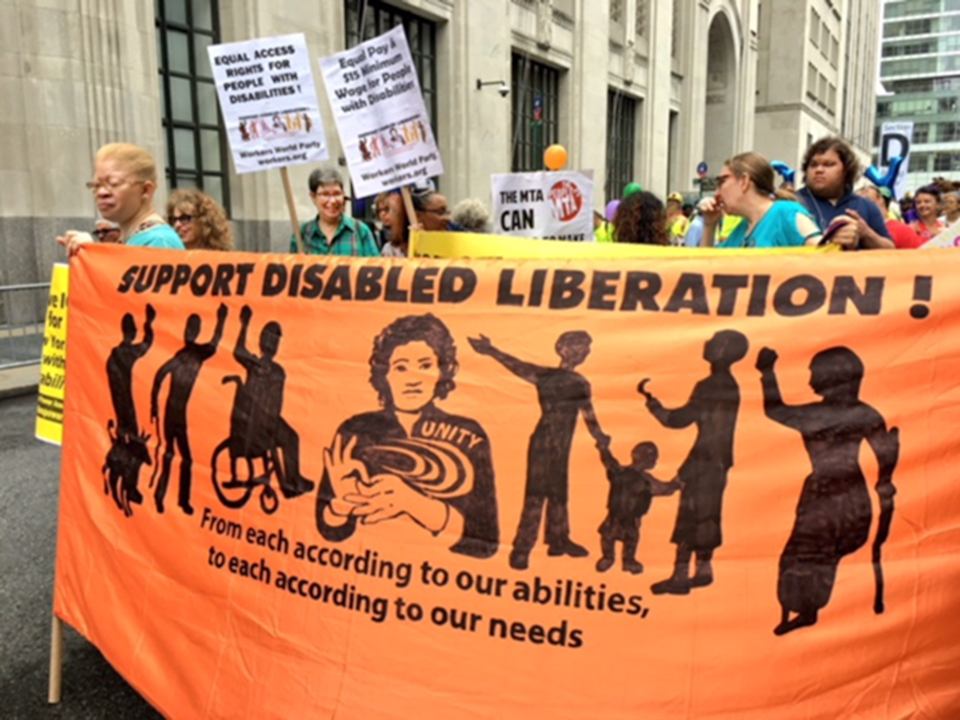

WWP contingent in Disability Pride parade.
“It’s time to recognize climate change as a disability rights issue” was the headline for an article by Tiffany Yu, founder of DiversABILITY. (Rooted in Rights, Dec. 11, 2017) DiversABILITY is a movement and organization dedicated to raising disability awareness and reshaping conceptions of ability.
When Yu was nine years old, a car accident killed her father and left her with brachial plexus palsy — a loss of movement or weakness in the arm due to damage to the nerves that send signals from the spine to the arm. After the bones in her leg healed, she had to relearn how to write (she was originally right-handed).
“We — the disability community — are the ones who need to be at the forefront of this movement,” Yu wrote. “When it comes down to it, climate justice is about people and climate change is a human rights issue. Climate change impacts vulnerable communities like mine the most. Opportunity and justice cannot be an afterthought. …
“Global temperatures have been increasing. Sixteen of the 17 hottest years on record have occurred since 2001. Extreme heat events cause more deaths annually in the U.S. than all other extreme weather events combined.
“Some members of the disability community are especially vulnerable to extreme heat events due to increased sensitivity to keeping our body temperatures cool enough. For example, people with multiple sclerosis have been shown to experience greater pain and fatigue on hot days, and some people with spinal cord injuries don’t have the ability to sweat as a means of cooling down.”
The United Nations Human Rights Council adopted a resolution on climate change and the rights of people with disabilities on July 12. The resolution calls on governments to adopt a disability-inclusive approach when taking action to address climate change. The U.S. government still refuses to ratify the U.N. Convention on the Rights of Persons with Disabilities. Approximately one in five people in the United States has a disability!
In 2005 Hurricane Katrina exposed numerous problems that impact people with disabilities during the climate-related disaster: not enough wheelchair-accessible transportation; short supplies of prescription medication and medical equipment like oxygen; lack of evacuation shelters with appropriate facilities; power outages that affect medical equipment, air conditioning and elevators; and a shortage of staff trained to meet the various needs of disabled people.
The National Council on Disability estimated that 155,000 people with disabilities were living in three of the Gulf Coast cities hardest hit by Katrina. Almost half of the deaths from Katrina were people over age 75 (less than 6 percent of the population in the area), with over 10 percent of total deaths occurring in nursing homes.
Socioeconomic factors create problems
In a 2016 article,“Climate Change, Extreme Heat, and People with Disabilities,” Alex Ghenis, a policy and research specialist at the World Institute on Disability and a person with a spinal cord injury disability, warned: “Socioeconomic factors, such as disproportionate rates of poverty and substandard housing for people with disabilities, create other problems; notably lower air-conditioner ownership or, if housing has air conditioning, not enough money to run it regularly. …
“[The] dislocation caused by rising sea levels, water shortages and climate-related conflicts [will create according to] The International Organization for Migration [approximately] over 100,000 ‘climate migrants’ by 2050 and many millions more will be forced to leave their homes, [disparately impacting] people with disabilities [because of ] a lack of accessible transportation or housing.” (tinyurl.com/y3cppgum)
There are many examples of how heat waves affect people with disabilities. Edward Yudelovich of the Workers World New York City Disabilities bureau, a person with a psychological emotional disability, was misdiagnosed with schizophrenia and treated with antipsychotic drugs for five years when he was in his twenties. After another psychiatrist corrected the misdiagnosis and weaned him off the addictive medication, he was horrified to learn from his comrades in the disability rights movement that antipsychotic drugs can impair the body’s ability to regulate temperature, so that during a heat wave, such drugs can literally “fry the brain!”
Mary Kaessinger, a People’s MTA activist with a mobility disability — multiple sclerosis for the past 40 years — says: “I can take the heat until it reaches 75˚F. If it gets any warmer, then I start to have trouble breathing. I put on a cooling vest which has four ice packs in it. That keeps my body temperature cool. I also wear a cooling hat which I soak in cold water for 20 minutes.
“I am also more susceptible to falling out of my scooter because the heat makes me much weaker. When it gets to 85˚F, the only recourse is staying home if you can afford air conditioning or hanging out at your local air-conditioned grocery store or air-conditioned public facility like the Brooklyn Academy of Music.
“The enforced poverty for disabled people in which we are cornered into remaining poor in order to protect our health insurance and benefits makes us more vulnerable from the climate crisis. Contrast this with Socialist Cuba and China which put disabled people first when responding to climate-caused emergencies!”
Raposo is a Portuguese Marxist analyst, editor of the web magazine jornalmudardevida.net, where this article…
By Alireza Salehi The following commentary first appeared on the Iranian-based Press TV at tinyurl.com/53hdhskk.…
This is Part Two of a series based on a talk given at a national…
Educators for Palestine released the following news release on July 19, 2025. Washington, D.C. Educators…
On July 17, a court in France ordered the release of Georges Abdallah, a Lebanese…
The following are highlights from a speech given by Yemen’s Ansarallah Commander Sayyed Abdul-Malik Badr…